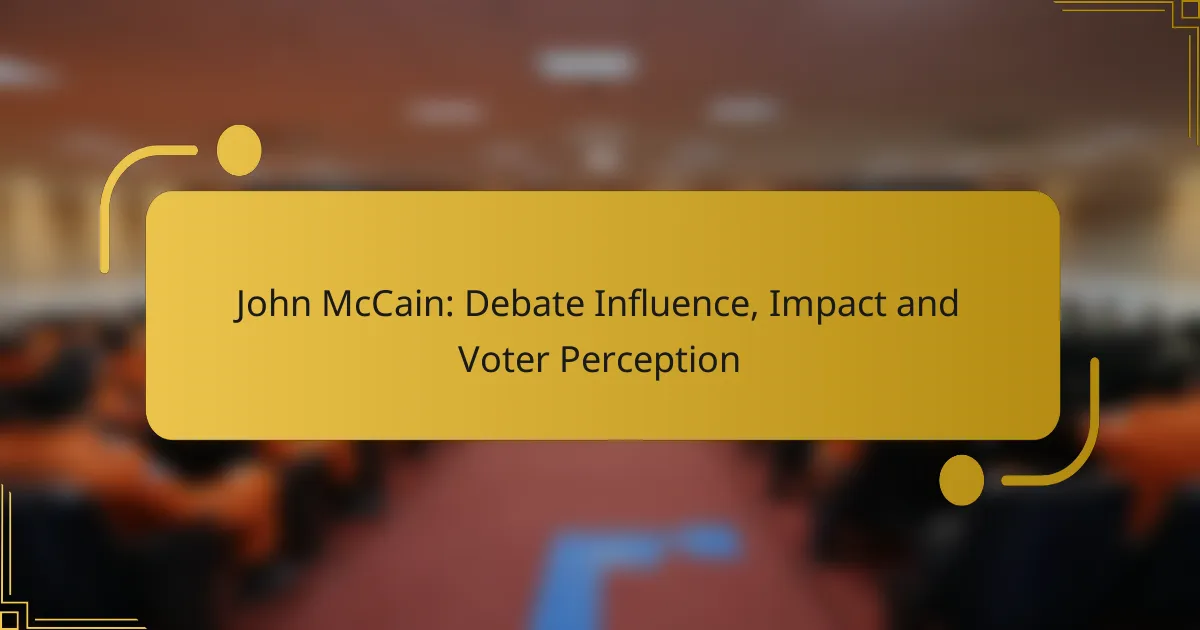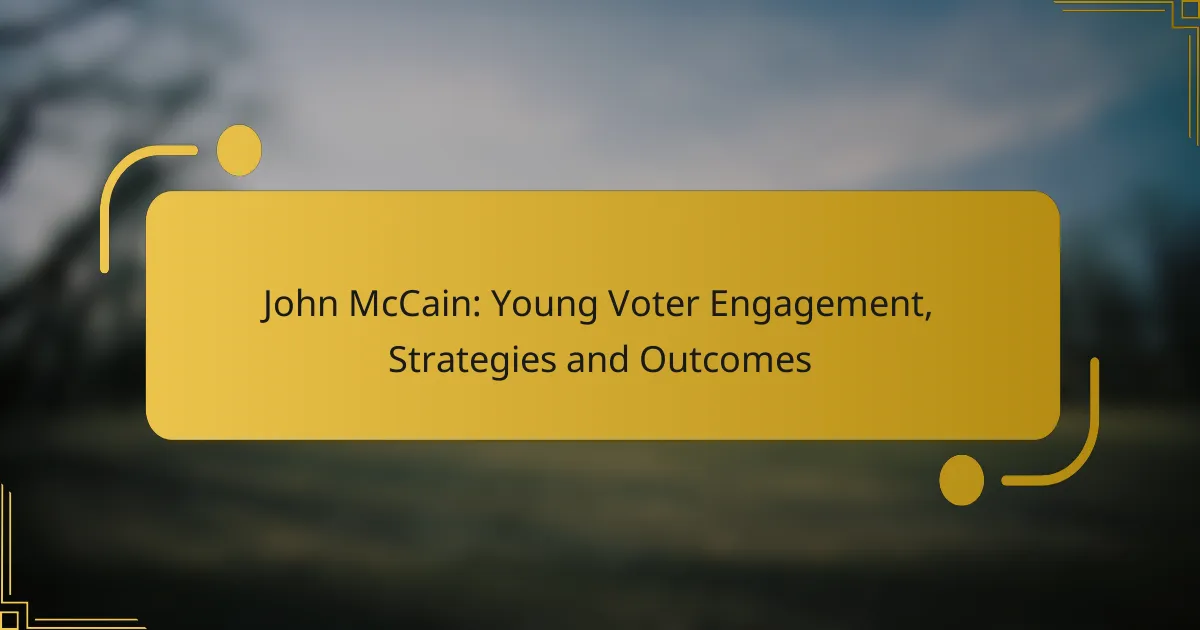John McCain’s impact on political debates in the 2000s was profound, marked by his candid style and innovative strategies that emphasized authenticity and direct communication. His unique approach not only reshaped candidate interactions but also significantly influenced voter perception, allowing him to connect with diverse demographics and alter public opinion during critical moments in his campaigns.

How did John McCain influence debates in the 2000s?
John McCain significantly influenced debates in the 2000s through his candid style, willingness to confront opponents, and innovative strategies. His approach reshaped how candidates engaged with each other and the electorate, emphasizing authenticity and direct communication.
Innovative debate strategies
McCain’s debate strategies often included a focus on personal stories and a conversational tone, which helped him connect with voters on a human level. He frequently used humor and self-deprecation, making his points more relatable and disarming his opponents.
Additionally, McCain was known for his willingness to break from party lines, which allowed him to appeal to a broader audience. This strategy encouraged other candidates to adopt a more open and less scripted approach in their debates.
Impact on Republican primary debates
During the Republican primary debates, McCain’s influence was evident in the way candidates interacted with each other. His direct confrontations and willingness to challenge party norms set a new standard for assertiveness among candidates.
As a result, subsequent debates featured more dynamic exchanges and a greater emphasis on personal accountability, which shifted voter expectations regarding candidate behavior and debate performance.
Memorable moments in televised debates
McCain’s debates were marked by several memorable moments, including his famous exchanges with Barack Obama during the 2008 presidential debates. These moments showcased his ability to remain composed under pressure while delivering impactful responses.
One notable instance was when McCain addressed the financial crisis, where he emphasized the importance of bipartisanship. Such moments not only defined his campaign but also left a lasting impression on the electorate regarding the importance of leadership and integrity in politics.

What was John McCain’s impact on voter perception?
John McCain significantly influenced voter perception through his unique approach to campaigning and debate performance. His ability to connect with various voter demographics, particularly during pivotal moments in his campaigns, shaped public opinion and altered the landscape of American politics.
Shifts in public opinion during campaigns
Throughout his campaigns, McCain experienced notable shifts in public opinion, often influenced by his debate performances. For instance, his candidacy in the 2008 presidential election saw a surge in support following his strong debate against Barack Obama, where he emphasized his experience and leadership qualities.
These shifts were often temporary, reflecting the immediate impact of televised debates. Voter sentiment could swing dramatically based on a single debate, highlighting the importance of effective communication and message delivery during these critical moments.
Influence on independent voters
McCain’s appeal to independent voters was a key aspect of his electoral strategy. His reputation as a maverick and willingness to cross party lines resonated with moderates who sought a candidate that represented bipartisan values.
In the 2008 election, McCain garnered significant support from independents, particularly in the early stages of the campaign. This demographic often valued his authenticity and experience, which contrasted with more partisan candidates.
Long-term effects on Republican brand
McCain’s influence on the Republican brand has been profound, especially in shaping its image as a party open to reform and dialogue. His legacy includes a more moderate stance on certain issues, which has encouraged subsequent candidates to appeal to a broader electorate.
However, this shift has also led to internal conflicts within the party, as more conservative factions have pushed back against McCain’s approach. The balance between appealing to traditional Republican values and embracing a more inclusive platform continues to affect the party’s identity today.

How did John McCain’s debate style differ from his opponents?
John McCain’s debate style was characterized by a direct and personal approach, setting him apart from his opponents. He focused on engaging voters through authenticity and relatability, which resonated with many viewers during his campaigns.
Direct engagement with voters
McCain prioritized direct engagement with voters, often addressing them personally during debates. This approach allowed him to establish a connection, making his points feel more relevant and immediate to the audience. By looking into the camera and speaking directly to the American people, he aimed to create a sense of trust and transparency.
His willingness to tackle contentious issues head-on also demonstrated his commitment to addressing voter concerns, which helped him stand out in a crowded field of candidates.
Use of humor and personal anecdotes
Humor and personal anecdotes were key elements of McCain’s debate style. He often used light-hearted jokes to diffuse tension and make complex issues more approachable. This technique not only entertained viewers but also made his arguments more memorable.
By sharing personal stories from his life, including his time as a POW, McCain humanized himself and reinforced his message of resilience and patriotism. These anecdotes helped voters relate to him on a personal level, enhancing his appeal.
Contrast with Barack Obama’s debate tactics
McCain’s debate tactics contrasted sharply with those of Barack Obama, who employed a more measured and analytical approach. While McCain focused on emotional engagement, Obama often emphasized policy details and broader themes. This difference in style reflected their respective campaign strategies and target audiences.
Obama’s calm demeanor and reliance on data-driven arguments appealed to voters seeking intellectual rigor, while McCain’s directness and personal touch resonated with those valuing authenticity. This divergence in tactics highlighted the varied ways candidates can connect with voters during high-stakes debates.

What criteria shaped John McCain’s debate performance?
John McCain’s debate performance was shaped by a combination of thorough preparation, strategic research, and the influence of his advisors. These elements collectively contributed to his ability to connect with voters and convey his political message effectively during debates.
Preparation and research methods
McCain’s preparation involved extensive research on his opponents and key issues relevant to the electorate. He focused on understanding public sentiment and tailoring his responses to resonate with voters’ concerns, particularly on topics like healthcare and national security.
Additionally, McCain practiced debate scenarios with his team, simulating potential questions and responses. This approach helped him refine his messaging and develop a confident delivery style that appealed to audiences.
Advisors and coaching influences
McCain relied on a team of seasoned advisors who provided insights and feedback throughout his debate preparations. These advisors helped him identify strengths and weaknesses in his arguments, allowing him to adjust his approach accordingly.
Coaching also played a vital role, with professionals guiding him on body language, tone, and pacing. This support enabled McCain to project authority and authenticity, crucial for voter perception during high-stakes debates.

What were the key debates that defined John McCain’s career?
John McCain’s career was significantly shaped by pivotal debates that showcased his political stance and resonated with voters. Notable debates in the 2000 and 2008 elections highlighted his approach to issues and his ability to connect with the electorate.
2008 Presidential debates
The 2008 presidential debates between John McCain and Barack Obama were crucial in defining McCain’s campaign strategy. McCain focused on his experience and foreign policy expertise, often contrasting his views with Obama’s approach to issues like the economy and healthcare.
During these debates, McCain aimed to appeal to undecided voters by emphasizing his bipartisan efforts and military background. His performance was marked by moments of tension, particularly when addressing the financial crisis, which ultimately influenced voter perceptions.
2000 New Hampshire primary debate
The 2000 New Hampshire primary debate was a turning point for McCain, showcasing his straight-talking style and appeal to independent voters. His candidacy gained momentum as he challenged the Republican establishment and addressed issues like campaign finance reform and veterans’ rights.
This debate highlighted McCain’s ability to connect with the audience, as he often used personal anecdotes to illustrate his points. His performance helped him secure a surprising victory in New Hampshire, setting the stage for a competitive primary season.
Impact of town hall meetings
Town hall meetings played a significant role in McCain’s campaign strategy, particularly in the 2008 election. These informal gatherings allowed him to engage directly with voters, addressing their concerns and questions in a personal setting.
McCain’s approach in these meetings emphasized transparency and accessibility, which resonated with many constituents. However, he faced challenges when contentious issues arose, requiring him to navigate complex voter sentiments effectively.

What emerging trends in debate strategy can be seen from McCain’s legacy?
John McCain’s legacy in debate strategy highlights the importance of authenticity, direct engagement with opponents, and the use of personal narratives. These elements have shaped how candidates approach debates, emphasizing the need for relatability and clear communication.
Authenticity in Debate Performance
Authenticity has become a crucial aspect of debate performance, as voters increasingly seek candidates who appear genuine and relatable. McCain’s straightforward demeanor resonated with many, demonstrating that being true to oneself can foster trust and connection with the audience.
To emulate this trend, candidates should focus on presenting their true selves rather than adopting scripted personas. This can involve sharing personal stories or experiences that highlight their values and beliefs, making them more relatable to voters.
Direct Engagement with Opponents
Direct engagement with opponents during debates allows candidates to address issues head-on and clarify their positions. McCain often challenged his opponents directly, which not only showcased his confidence but also provided voters with clear contrasts between candidates.
To effectively engage opponents, candidates should prepare specific counterarguments and practice responding to potential criticisms. This approach can help voters understand the differences in policy and character, ultimately influencing their decisions.
Utilization of Personal Narratives
Personal narratives have emerged as a powerful tool in debate strategy, allowing candidates to connect emotionally with voters. McCain frequently shared his experiences as a prisoner of war, which added depth to his character and highlighted his resilience.
Candidates should consider incorporating their own life stories into their debate performances. This can create an emotional bond with the audience and make their messages more impactful. However, it is essential to ensure that these narratives are relevant to the issues at hand and resonate with the voters’ concerns.



